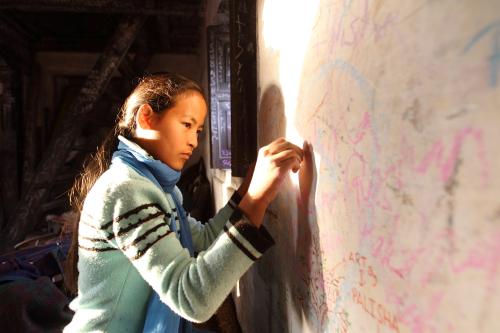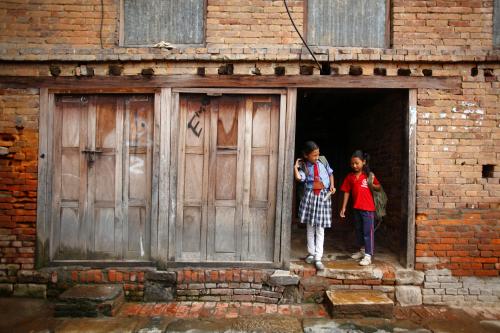The garment industry transformed the Bangladesh economy and women’s lives—it increased their economic empowerment. But women are not leading the industry despite making up more than 90 percent of the workforce.
One explanation is that women lack the technical and digital skills to lead innovation in the sector, as well as the capacity to overcome structural barriers like violence, discrimination, exploitation, and physical and mental harassment.
Automation further compounds the challenges women face in the garment industry. Girls and women must catch up to the new realities of automation to ensure they evolve with the jobs of the future. But it’s not just the garment industry in Bangladesh that needs a female workforce educated in science, technology, engineering, and mathematics (STEM)—we need more STEM teachers, agricultural leaders, scientists, mathematicians, and engineers as industries evolve.
More female students attend school today in Bangladesh than ever before, but the overall quality of education is poor, and rural schools are heavily under-resourced. Numerous factors, like lack of support from family and society, lack of good teachers, violence, child marriage, and prejudice against the rural community—among other factors—affect rural girls’ education. This is even more so the case concerning their participation in STEM subjects, and consequently, in STEM careers: South and West Asia have the lowest proportion of women in STEM in the world, and Bangladesh is at the very bottom with only 14 percent involved in STEM.
To ensure a sustainable future for Bangladesh, the country needs to consider STEM as an important catalyst. As I’ve said in previous op-eds, “We need more scientists and innovators and only proper STEM education can hold the key [to] this success.” We must strengthen girls’ education in STEM subjects, as it will not only help increase their meaningful participation in STEM activities, but also help change the exploitative conditions in STEM-related industries, like garment-making, where they work. Women’s participation in STEM fields can bring economic progress for them and their families, fueling growth of the Bangladesh economy.
In the past 20 years of my professional life, I have been working to promote quality education, STEM fields, girls’ education and rights, and women’s empowerment. While many people think girls aren’t interested in STEM, I beg to differ. The organization I founded, Education and Cultural Society (ECS), has formed 30 STEM clubs in different educational institutions across Bangladesh with hundreds of girls eager to participate. We have organized many STEM innovation fairs and a conference. But we must work more rigorously for sustainable solutions and to bridge grassroots efforts like mine with infrastructure changes at the policy level.
Because this issue is so urgent, I came to Brookings as an Echidna Global Scholar to highlight the need to lift up girls in Bangladesh through STEM. During my time at Brookings, my research will identify the challenges rural girls experience in accessing STEM education in Bangladesh, as well as some concrete solutions to empower rural girls, enhance awareness among policymakers to improve and provide equal access to STEM education and career opportunities, and spread STEM knowledge across all sectors of society.
After returning home from this program, I want to make long-lasting impact by equipping female workers with the necessary technical and digital skills to become leaders in the Bangladesh workforce.






Commentary
Why we need to enhance STEM education for rural girls in Bangladesh
July 1, 2019